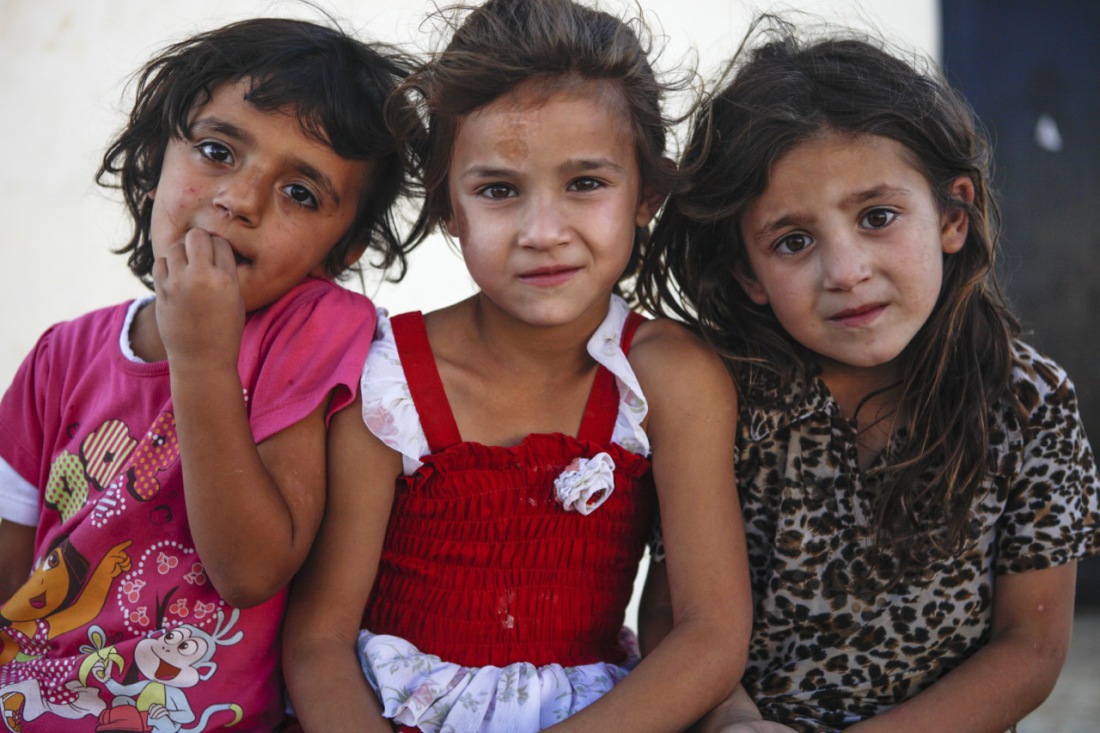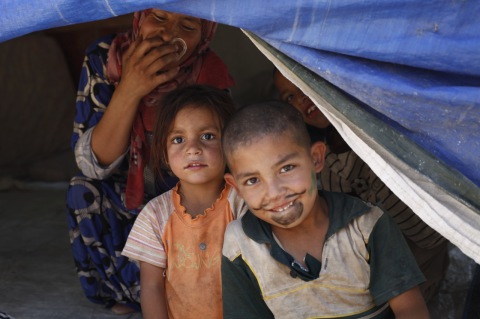The Syrian Civil War has left nearly 200,000 dead and 9 million displaced since it began in March 2011. Of those displaced, roughly 3 million have fled the country, settling in camps resting, in some cases, mere yards from the Syrian border. It’s these camps that are the focus of (DIS)PLACED:Life As A Tent City Refugee, an ongoing exhibition at the aSHEville Museum that explores and relays a sense of life as a Syrian refugee.
(DIS)PLACED features a collection of diagrams and maps, a brief video documentary and 34 color photographs by Asheville-based photographer and journalist Jennifer MacDonald. She co-curated and designed the exhibition with fellow artist Vanessa Bell after spending much of this summer traveling to and from Syria and the surrounding countries, documenting both the conflict’s societal and psychological toll and life in the region’s swelling refugee camps.
The exhibition’s photographic works stem from a two-week-long stay at one site in particular: Musaab al Tuliani, a refugee camp located in Lebanon, just 3 miles from the Syrian border.
“There are no ‘official’ government supported camps in Lebanon, although [that country] holds the most [1.2 million] refugees of any host nation,” says MacDonald. “All the camps are a real hodgepodge, one often bleeding into the other so it becomes hard to say how many are actually there.”
MacDonald estimates that Musaab al Tuliana, unlike the sprawling, heavily publicized Mrajeeb Al Fhood and Zaatari camps in nearby Jordan, is home to roughly 400 refugees. Most are women and children, many who fled while spouses and family members stayed behind to either work, defend their homes or fight, or were killed in action, she says.
MacDonald’s photographs, however, reveal a stoic populace where one would expect tears and grief. Likewise, the landscape, though harsh and unforgiving, is serene and beautiful. Several topographic shots posit the camp in a wide, tranquil valley that rests below a steep rise of rocky, treeless mountains. MacDonald’s images of the refugees are more revealing of the camp’s emotional atmosphere.
Three little girls no older than 5 or 6 and with deep, near-black eyes stare into the camera in one shot. One wears a Dora the Explorer T-shirt, another has a red and white-frilled dress, the last a small leopard print collared shirt. They seem resigned, yet contemplative. Two children peer out from behind a royal blue tent flap in another photo. The little boy, sitting in front of either his sister or a same-age friend and his mother, maybe, has a thin mustache and a goatee painted on his chin. It’s a small bit of humor, a rare sentiment, MacDonald says, that get many of the children through their days.
This isn’t to say that her subjects are overjoyed or necessarily optimistic, she says, as the pains of their dislocation are omnipresent. “What they are is resilient, patriotic and deeply rooted in family life, and they have found ways to make their time in the camps bearable, but barely.” Other photos feature tasks of daily life, such as gathering water, teaching class at the camp’s small school and tending to their temporary homes.
“The Syrians I encountered were some of the most dignified, hospitable and gracious people I have encountered in my travels, especially considering their circumstances,” she says. “As you can imagine, there are many journalists, writers, etc. who all want a look into the camps for a story, and many of the residents are tired of what they refer to as the ‘exploitation of their suffering’ without any obvious benefit for them.”
MacDonald sought to break from this pattern and has since founded the Hadaya Toy Basket Fund. The project, she says, aims to provide one basket of simple, timeless toys (such as a ball, kite, jump rope, etc) art supplies, books and a solar light to each of the 200 families in the Musaab al Tuliana camp. “I wanted to take a different approach, which is why I am encouraging the public to participate at some level,” she says.
For museum hours and more information on the exhibition, visit www.ashevillemuseum.com. For more on the HADAYA project, visit http://www.theluminousscope.com/hadaya-toy-basket-2/.
WHAT: (DIS)PLACED: Life As A Tent City Refugee
WHERE: aSHEville Museum — 35 Wall St. Asheville, NC
WHEN: On view through Dec. 31, 2014




On Wednesday, November 5th, The Weinhaus will be hosting a benefit dinner for Rojava, the hard hit region of Kurdistan situated in Northern Syria. Join us for a catered vegetarian meal with door prizes donated by local businesses, live music with Asheville funk-blues band Muscadine and a cash bar. All ticket proceeds will support the Kurdish Red Crescent, a twenty-one year old regional affiliate of the respected International Red Cross and Red Crescent Movement. More info at: https://www.facebook.com/events/591169224342654